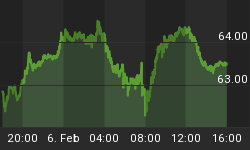BIG PICTURE - Cash is trash! Today, currencies continue to perform their function as a medium of exchange, but they certainly aren't a genuine store of value; or a guardian of purchasing power. Thanks to the ongoing unprecedented money-supply and credit growth (inflation) on a global scale, currencies have stopped fulfilling this crucial function; thereby robbing the masses of their hard-earned savings. In this highly inflationary world where more or less everything is in a bull-market (at least when measured against various currencies), the only "asset" that is in the bear's lair is central-bank produced paper "money". Figure 1 clearly highlights the fact that the major world currencies have lost between 25% and 75% of their purchasing power through inflation since 1980! For this system to work however, this solitary bear-market in "money" must remain concealed from the public for the fear that the masses may stop accepting these currencies as a medium of exchange. In order to proliferate this fraud, the officials keep up with the "inflation-fighting" propaganda through their totally bogus and meaningless "inflation" figures which are constantly spewed out by the media.
Figure 1: Safe haven of cash?

Source: Hans Eisenkolb
Taking into account the course of action chosen by the various central-banks, I am convinced that the various currencies will continue to depreciate in value against assets. In other words, I expect that the stealth confiscation of savings will continue through inflation. For sure, they may be temporary set-backs or corrections in asset-prices but the major trend is up. Before you disagree with my assessment, take into account the fact that despite an average economic backdrop (sky-high deficits and debt-levels in the developed nations), over the past 4 years, all assets appreciated at the same time! Despite rising interest-rates and geo-political tensions, even property and bond prices managed to stay strong together with equities, commodities and collectibles.
At the beginning of this decade, if I had told you that 7 years later crude oil would be trading above $60 per barrel, gold would be close to $700 per ounce, food prices would be at multi-year highs and the Dow Jones would be trading around 13,500, you would have pronounced me crazy! However, this is exactly what has happened and there is nothing in the works to suggest that this major trend is about to change in the near future. In other words, I anticipate that barring short or medium-term corrections, asset-prices will continue to trend higher in nominal terms UNLESS the central-banks change their expansionary monetary policies and decide to rapidly raise interest-rates. In all likelihood, this scenario may not unfold for a few more years and until such time, investors should be able to protect their savings through the returns generated from the capital markets.
In the world of investing, it all comes down to supply and demand. Items which are in high demand tend to rise in value against items whose supply is increasing rapidly. So, turning to today's situation, the money-supply is rising by roughly 10% per annum in several countries and the supply of assets is not keeping pace. Hence the bull-market in asset-prices when measured in terms of currencies. Now, I am not saying that the explosive growth in the supply of currencies cannot and will not be reversed in the future, thereby causing sharp contractions in asset-prices. For sure, it could easily reverse. But for that to happen, we would have to see genuine monetary-tightening through significantly higher interest-rates and a sharp increase in the banks' minimum reserve requirements. The central banks know fully well that given the high debt levels, such drastic measures would probably cause a global depression, widespread unemployment and social unrest. So, they will try and avoid or delay this outcome as much as possible, thereby further assisting the bull-market in asset-prices and the death spiral for your cash savings.
Recently, several well-regarded economists and analysts have issued compelling reports explaining why the end is nigh. I tend to agree with their assessment that some assets are over-stretched and ripe for a correction (Chinese A-shares come to mind). However, I do not buy into the thesis that just because the bull-market in equities and commodities is 5 years old, it must stop immediately. History has shown that since the abandonment of gold in the early 1970's, bull-markets have lasted for very long periods of time. Moreover, the current bull-market in equities (especially my preferred emerging-markets) and natural resources is well-supported by the very real forces of Asian industrialization, urbanization together with supply and demand imbalances. So, taking into account the strong money-supply growth and the rapid transformation of Asia and Latin America, I am inclined to think that the global boom in stocks and commodities will continue for several more years.
There can be no disputing the fact that the global expansion is now 5 years old and well-advertised, accordingly the "low-hanging fruit may not come by so easily. Furthermore, I envisage that in the future, investors will have to become more selective when making decisions and deploying their capital. For maximum success and safety, I would urge you to invest your capital during pullbacks whilst avoiding overstretched markets. Despite all the talk of "doom & gloom", this strategy should continue to deliver reasonable returns in the period ahead.
The above is an excerpt from Money Matters, a monthly economic publication, which highlights extraordinary investment opportunities in all major markets. In addition to the monthly reports, subscribers also benefit from timely and concise "Email Updates", which are sent out when an important development in the capital markets warrants immediate attention. Subscribe Today!















